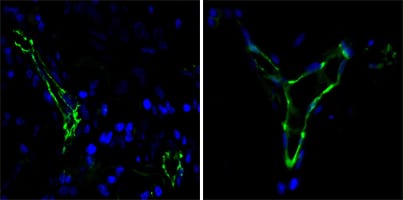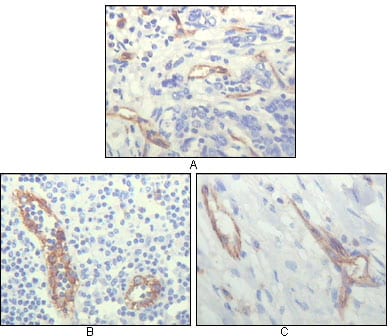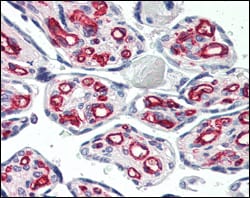


| WB | 咨询技术 | Human,Mouse,Rat |
| IF | 咨询技术 | Human,Mouse,Rat |
| IHC | 1/200 - 1/1000 | Human,Mouse,Rat |
| ICC | 1/200 - 1/1000 | Human,Mouse,Rat |
| FCM | 咨询技术 | Human,Mouse,Rat |
| Elisa | 1/10000 | Human,Mouse,Rat |
| Aliases | CD31; PECAM-1; PECAM1 |
| Entrez GeneID | 5175 |
| clone | 2F7B2 |
| Host/Isotype | Mouse IgG1 |
| Antibody Type | Primary antibody |
| Storage | Store at 4°C short term. Aliquot and store at -20°C long term. Avoid freeze/thaw cycles. |
| Species Reactivity | Human |
| Immunogen | Purified recombinant fragment of human CD31 expressed in E. Coli. |
| Formulation | Purified antibody in PBS with 0.05% sodium azide. |
+ +
以下是3篇关于CD31抗体的参考文献及其摘要概括:
1. **"PECAM-1 (CD31) functions as a reservoir for and regulator of cell-surface free thiols"**
- **作者**: F.J. DeLisser et al.
- **摘要**: 该研究揭示了CD31(PECAM-1)在血管内皮细胞表面通过其胞外结构域调节游离硫醇的氧化还原状态,影响细胞黏附和白细胞的跨内皮迁移过程。
2. **"CD31 antibody-directed therapy for neuroblastoma"**
- **作者**: C. Urbinati et al.
- **摘要**: 探讨CD31抗体在神经母细胞瘤治疗中的靶向作用,通过抗体介导的药物递送系统抑制肿瘤血管生成,减少肿瘤生长和转移。
3. **"CD31 as a marker for angiogenesis in tumor tissues"**
- **作者**: P. Vajkoczy et al.
- **摘要**: 研究利用CD31抗体进行肿瘤组织微血管密度(MVD)定量分析,验证其作为血管生成标志物在癌症预后评估和抗血管治疗中的应用价值。
4. **"Role of CD31 in endothelial cell mechanotransduction"**
- **作者**: M.A. Gimbrone et al.
- **摘要**: 分析CD31在响应血流剪切力中的功能,发现其通过调控内皮细胞信号通路参与血管稳态维持和动脉粥样硬化病理过程。
以上文献覆盖了CD31在基础机制、疾病治疗及诊断技术中的研究,如需具体期刊或年份可进一步补充。
CD31 antibody targets the CD31 protein, also known as Platelet Endothelial Cell Adhesion Molecule-1 (PECAM-1), a 130-kDa transmembrane glycoprotein belonging to the immunoglobulin (Ig) superfamily. Expressed predominantly on vascular endothelial cells, platelets, and certain immune cells, CD31 plays critical roles in cell-cell adhesion, leukocyte transmigration, and vascular homeostasis. Its structure includes six extracellular Ig-like domains, a transmembrane region, and a cytoplasmic tail involved in signaling. CD31 mediates homophilic (CD31-CD31) and heterophilic interactions, regulating inflammatory responses, angiogenesis, and endothelial barrier integrity.
CD31 antibodies are widely used in research and diagnostics to identify endothelial cells, assess vascularization, and study pathological processes like tumor angiogenesis, atherosclerosis, and thrombosis. In immunohistochemistry, these antibodies help visualize microvessel density in cancer tissues, aiding prognostic evaluations. They are also employed in flow cytometry to characterize endothelial progenitor cells or activated platelets. Commercially available clones (e.g., JC70A, WM59) vary in epitope specificity and compatibility with fixation methods, influencing experimental outcomes. Beyond research, CD31 antibodies assist in diagnosing vascular tumors and differentiating endothelial neoplasms from other malignancies. Recent studies explore their therapeutic potential in modulating inflammation or enhancing drug delivery to vascular targets. However, cross-reactivity with non-endothelial cells or species-specific variations requires careful validation in experimental models.
×